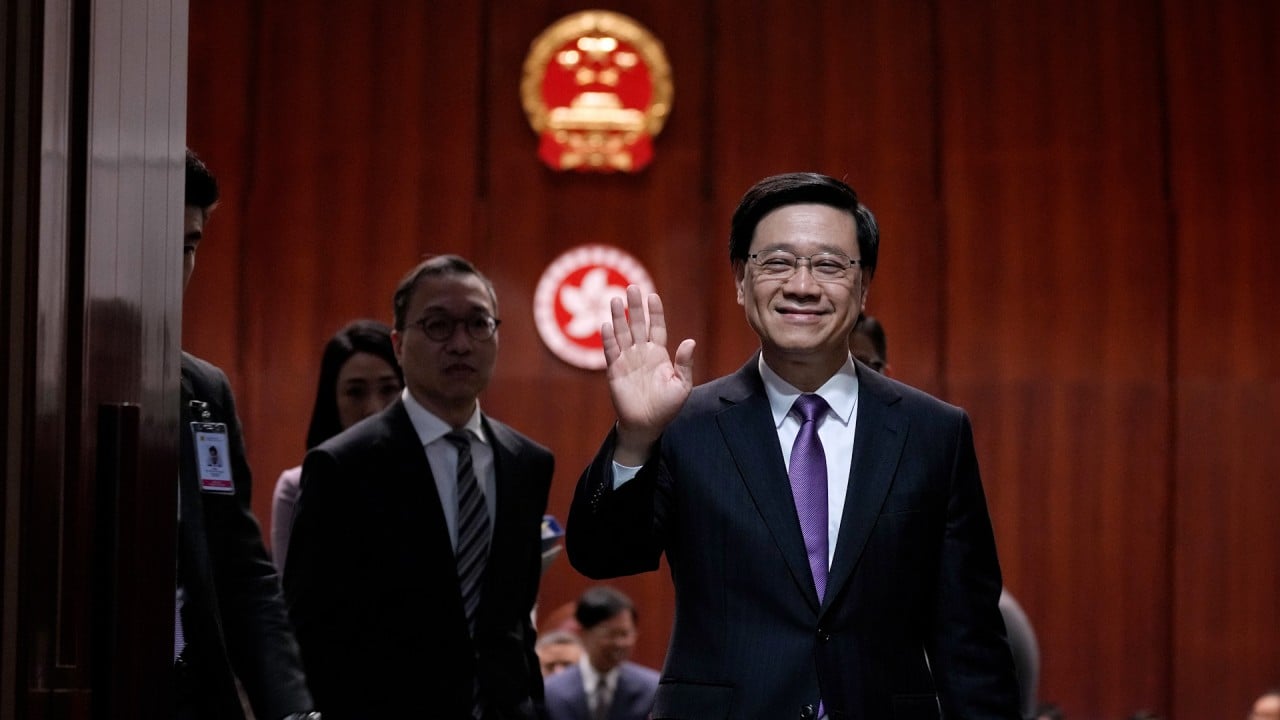
Hong Kong’s Article 23 law: Beijing says ‘clumsy political shows’ by foreign forces won’t upset city’s path to prosperity
- Post learns city leader John Lee may sign domestic national security law on Friday, before authorities publish legislation in ‘special edition’ of gazette on Saturday
- China’s foreign ministry’s arm in Hong Kong bats back at United States, Canada and Japan for ‘smears and attacks’ against Article 23 legislation
The commissioner’s office for China’s foreign affairs ministry in Hong Kong defended the Safeguarding National Security Ordinance on Thursday, slamming the United States, Canada and Japan for their “smears and attacks” on the law.
In a strongly worded statement titled: “The clumsy political shows of certain external forces cannot derail Hong Kong’s trajectory from stability to prosperity”, the office said certain countries and politicians had turned a blind eye to their own nations’ extensive and stringent security laws.
“These are blatant acts of hypocritical double standards and a deliberate manipulation for the sake of ulterior motives,” a spokesman for the office said, two days after the city’s legislature passed the law.
The spokesman stressed the legislation’s enactment was a domestic affair, urging foreign powers to abide by international norms and refrain from “making unwarranted comments or interfering in such matters”.
“Some American politicians and media denounced its people’s siege of the US Capitol building over the presidential election as a riot, but beautified the street violence in Hong Kong as ‘the pursuit of democracy and freedom’ and as a ‘beautiful scene’,” it wrote.
The US State Department said on Tuesday that the Article 23 law could potentially “accelerate the closing of Hong Kong’s once-open society”.
Washington was “analysing” the law’s “incredibly vague” definitions to understand the potential risks facing American citizens, it said.
A day later, Canada said Hong Kong’s domestic national security law failed “to safeguard the human rights and freedoms” enshrined in the city’s mini-constitution and international agreements.
“The new law risks compounding the chilling effect created by the national security law at a moment when the city is trying to maintain its status as an open and free international hub,” the country’s global affairs department said, referring to the state security legislation enacted at Beijing’s direction in 2020.
Canada also raised concerns over the new law’s broad definitions of offences, arguing the legislation lacked any clear provisions for an independent review mechanism to ensure proportionality, transparency and accountability in the ordinance’s application.
Japan expressed its “grave concern” over the Article 23 law, saying it would further undermine confidence in Hong Kong’s “one country, two systems” governing principle.
China’s foreign ministry arm in Hong Kong has issued three statements in two days in defence of the legislation, earlier taking aim at the United Kingdom and the European Union for their views of the law.
Taiwan also spoke out against the legislation, with foreign ministry spokesman Jeff Li reiterating its unwavering support for the “pursuit of freedom and democracy” in Hong Kong.
Li told a virtual conference that Taiwan would “learn from Hong Kong’s lesson” by allying with “like-minded democratic partners to firmly safeguard the universal values of a civilised society”.
Hong Kong’s deputy secretary for justice, Horace Cheung Kwok-kwan, defended the Article 23 law at a United Nations meeting in Geneva on Wednesday, arguing that any endeavours to discredit or undermine the legislation were misguided.
“The comments by some countries and organisations on this are made in complete disregard of basic jurisprudence and facts, and demonstrate nothing more than double standards and sophistry,” he told the 55th regular session of the UN Human Rights Council.
Will Hong Kong politicians be targeted over role in Article 23 law?
The deputy minister also said there was no risk of the “general public inadvertently violating the law”, thanks to its clearly defined provisions that outlined exceptions and defences.
Separately, the spokesman of the Commissioner’s Office of China’s Foreign Ministry in Hong Kong rebutted an editorial carried by The Wall Street Journal under the headline of “Hong Kong’s Giant Leap Backward”, saying its claims of the city becoming a more dangerous place after the passage of the new national security law was merely aimed at “catching readers’ eyes”.
“The editorial asserts that Hong Kong ‘turning attention to the economy may be too late,” it said. “Don’t be a worrywart. You have been doomsaying about China maybe hundreds of times for the past decades, but the accuracy is pathetic.”
The Safeguarding National Security Ordinance spans 39 crimes divided into five categories: treason; insurrection, incitement to mutiny and disaffection, and acts with seditious intent; sabotage; external interference; and theft of state secrets and espionage.
Four of the offences are punishable by up to life imprisonment, with some applicable to offenders based outside Hong Kong.



